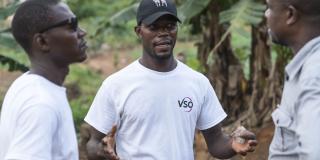
Natural disasters are on the rise around the world. VSO – with the support of the EU Aid Volunteers initiative of the European Union – have been preparing our country offices, communities and volunteers to anticipate, prepare for and better respond to the increasing risks they are facing.
It’s no secret that natural disasters are increasing in frequency and scale. The past year has seen a shocking run of record-breaking disasters from forest fires to storms, droughts and heatwaves. And a growing body of evidence is being published showing their correlation with climate change.
In early 2018, four consecutive poor rainy seasons in conjunction with prolonged conflict brought Somalia to the brink of famine, with 2.6 million people displaced. In August, the monsoon flooding of Kerala in Southern India was described as the worst in a century.
In September, thanks to rising sea temperatures, Super Typhoon Mangkhut – the strongest storm of this year – battered the Philippines and southern China, forcing 2.5 million to evacuate. And this month, as we’ve all seen, were the deadliest, most destructive forest fires in California’s history.
These were the disasters that dominated the media. The great majority, however, went underreported, happening on a more confined scale but still causing a terrible impact to the vulnerable communities and people already marginalised by poverty and inequality.
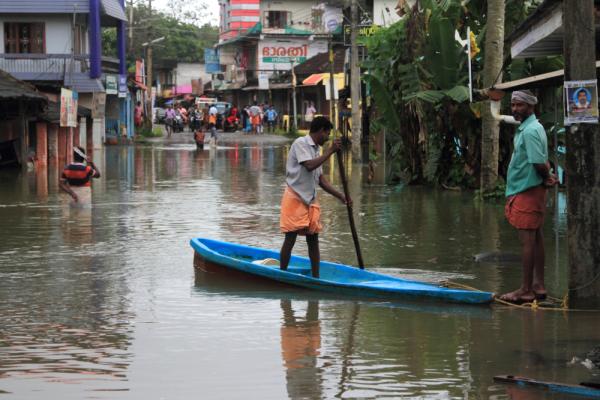
200 countries unite to prepare for disasters
In October, the Intergovernmental Panel on Climate Change (IPCC) – the UN’s leading scientific body on climate change – warned that extreme weather events will become even more frequent if countries fail to improve their climate plans and align them with the goals of the Paris Agreement.
The ground-breaking report, published by the IPCC’s coalition of world-leading climate scientists, said urgent changes are needed to cut the risk of extreme heat, floods, drought and poverty. It’s an alarm call to the world that we only have a small window of time to act to address climate change.
Next week 30,000 participants from almost 200 countries will participate in this year’s conference, COP 24, where the IPCC’s report will be formally discussed.
They’ll be coming together to talk about global and national responses to challenge of reducing carbon emissions, and preparing for the increasing threat of natural disasters – by making sure that disaster risk reduction is integrated into their development objectives, the UN said ahead of the conference.
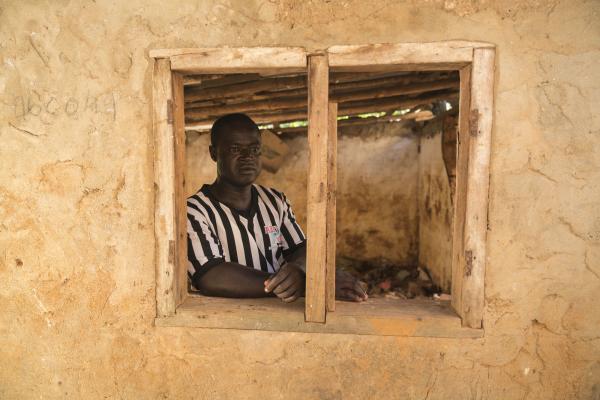
Training teams to prevent disasters of the future
This autumn, VSO has been implementing an initiative called BeCapable, part of the EU’s Aid Volunteers (EUAV) scheme. Through regional workshops, we’ve been training nine teams in Asia and Africa on resilience, humanitarian response and disaster risk reduction.
The work has brought together VSO programme teams, volunteers, primary actors and partners to build their skills in resilience, humanitarian response and disaster risk reduction. It has also enabled VSO to establish plans at community and national level to prepare for future risks. Community, national and international volunteers can play a key role in making the communities we work in prepared and resilient for disasters.
“I've appreciated learning about the framework around asset building and the roles of international agencies in resilience,” said Tesfaw Mohammed, Education Programme Manager at VSO Ethiopia. “When I return, I have a better awareness of who to co-ordinate to enable us to support our volunteers better.”
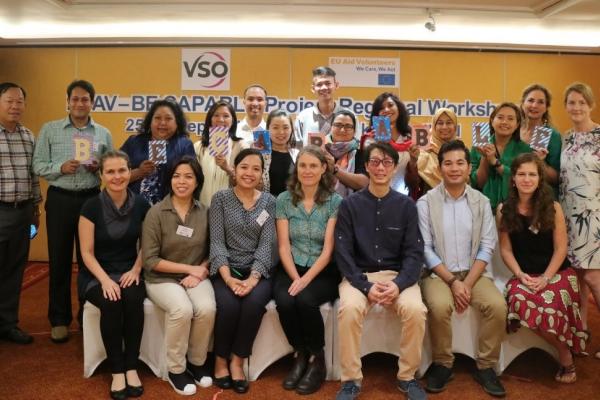
Building capacity to reduce the impact of disasters
In Bangkok and Nairobi, VSO launched resilience and humanitarian learning resources, developed with the support of EUAV, and rolled out by programme staff, volunteers and partners in nine countries. These cover everything from essential concepts, to the tools and processes such as emergency needs assessments and community-led disaster risk reduction planning.
“Volunteers form the first line of response when disasters strike,” said Chawaratt. “They’re the first to take action and the last on the scene, continuing recovery interventions long after external support leaves.”
“Naturally, a key element of our training is about supporting our local community volunteers to be able to do this well – and maximising on the knowledge and skills that EUAV volunteers bring to the table.”
This can include volunteers making sure the most at-risk groups can take part in making plans to reduce their own vulnerability: such as through setting up preparedness plans, or harnessing local expertise in agriculture or water management to mitigate the impacts of climate change.
And underpinning all of this is a need to make sure that our volunteers’ wellbeing and resilience is critical. We always make sure that when they’re working in fragile areas at risk or impacted by disaster, they’re fully prepared for their placement.
Chawaratt ChawarangkulUnprecedented levels of rainfall contribute to the loss of life in events such as the Sierra Leonean mudslide, while typhoons in Asia force the evacuation of millions. What these events tell us is that the level of risk that already exists is being heightened in an unprecedented way by climate change.
EUAV BE CAPABLE Project Manager
It’s easy to feel powerless in the face of a warming world – but the most at risk communities are demonstrating the power of human resilience. While there’s a need for international efforts to secure political and economic solutions to global warming, there’s an equally pressing need to engage the most at-risk groups to reduce vulnerability to disaster.
“Through being better prepared, we can ensure that the most vulnerable groups can access the information, skills and assets they need to increase their resilience in the face of disaster. VSO believes community, national and international volunteers have huge potential to contribute to building preparedness and resilience,” Chawaratt added.
Read more
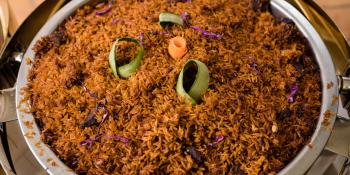
Kenyan beef pilau recipe
In this blog, some of our VSO family share their favourite mouth-watering recipes and highlight the work they’re doing to promote sustainable farming practices and healthy eating. Here is a recipe for Kenyan beef pilau from volunteer Fridah.
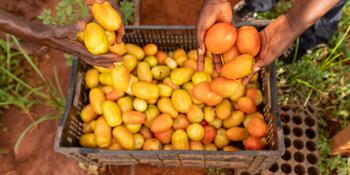
Bangladeshi tomato bhorta recipe
In this blog, some of our VSO family share their favourite mouth-watering recipes and highlight the work they’re doing to promote sustainable farming practices and healthy eating. Here is the Bangladeshi tomato bhorta inspired by Maleka’s vegetable garden.

Pakistani chicken biryani recipe
In this blog, some of our VSO family share their favourite mouth-watering recipes and highlight the work they’re doing to promote sustainable farming practices and healthy eating. Here is Pakistani chicken biryani from volunteer Khajida.
